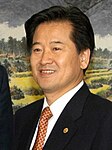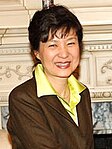| This article does not cite any sources. Please help improve this article by adding citations to reliable sources. Unsourced material may be challenged and removed. Find sources: "2004 South Korean legislative election" – news · newspapers · books · scholar · JSTOR (May 2019) (Learn how and when to remove this message) |
| |||||||||||||||||||||||||||||||||||||||||||||||||||||||||||||||||||||||
| ← outgoing memberselected members → | |||||||||||||||||||||||||||||||||||||||||||||||||||||||||||||||||||||||
All 299 seats in the National Assembly 150 seats needed for a majority | |||||||||||||||||||||||||||||||||||||||||||||||||||||||||||||||||||||||
|---|---|---|---|---|---|---|---|---|---|---|---|---|---|---|---|---|---|---|---|---|---|---|---|---|---|---|---|---|---|---|---|---|---|---|---|---|---|---|---|---|---|---|---|---|---|---|---|---|---|---|---|---|---|---|---|---|---|---|---|---|---|---|---|---|---|---|---|---|---|---|---|
| Turnout | 60.63% ( 60.63% (New; PR votes) | ||||||||||||||||||||||||||||||||||||||||||||||||||||||||||||||||||||||
| |||||||||||||||||||||||||||||||||||||||||||||||||||||||||||||||||||||||
 | |||||||||||||||||||||||||||||||||||||||||||||||||||||||||||||||||||||||
| |||||||||||||||||||||||||||||||||||||||||||||||||||||||||||||||||||||||
| This article is part of a series on |
| Politics of South Korea |
|---|
 |
|
Government |
|
Legislature |
Executive
|
Judiciary
|
|
Elections
|
|
Political parties
|
| Korean conflict |
Legislative elections were held in South Korea on 15 April 2004. In the 17th election for the National Assembly, voters elected 299 members of the legislature. The newly formed Uri Party and other parties supporting President Roh Moo-hyun, who was impeached by the outgoing National Assembly, won a majority of seats. This was the first time a centre-left liberal party won a majority in the National Assembly.
Electoral system
See also: Legislative elections in South KoreaThe election was held under parallel voting, with 243 members elected in single-member constituencies via first-past-the-post voting and the remainder elected via proportional representation. Proportional seats were only available to parties which one three percent of the national valid vote among seat-allocated parties and/or won five or more constituency seats.
Political parties
See also: List of political parties in South Korea| Parties | Leader | Ideology | Seats | Status | ||
|---|---|---|---|---|---|---|
| Last election | Before election | |||||
| Grand National Party | Park Geun-hye | Conservatism | 133 / 273 | 139 / 273 | Opposition | |
| Millennium Democratic Party | Cho Soon-hyung | Liberalism | 115 / 273 | 59 / 273 | Government (2000–2003) | |
| Opposition (2003–2004) | ||||||
| 49 / 273 | Government (2003–2004) | |||||
| United Liberal Democrats | Kim Jong-pil | Conservatism | 17 / 273 | 10 / 273 | Governing coalition (2000–2001) | |
| Opposition (2001–2004) | ||||||
| Democratic People's Party | Conservatism | 2 / 273 | 1 / 273 | Opposition | ||
| New Korea Party of Hope | Conservatism | 1 / 273 | Dissolved | |||
The newly formed liberal Uri Party (Uri-dang or Our Party) gained support through its opposition to the impeachment of President Roh. It won 32 out of 49 seats in Seoul, 44 out of 62 in Incheon and Gyeonggi, confirming that a majority of voters supported the President Roh.
The conservative Grand National Party, which supported the impeachment of President Roh, suffered a loss of support, but won a majority in North Gyeongsang and South Gyeongsang regions and retained the 100 seats necessary to block constitutional changes.
The progressive, socialist Democratic Labor Party got 13.03% of vote share, but won only 10 out of 299 seats due to the FPTP system. However this was considered as a great triumph considering that political landscape of South Korea is traditionally anti-communist and against left-wing policies. DLP also won two FPTP seats in Ulsan based on the Hyundai labor union.
The Millennium Democratic Party, formerly the major liberal party, was the second-largest party prior to the election but sustained the biggest loss in the backlash following its leading role in the impeachment of Roh, as much of its support shifted to the Uri Party.
The United Liberal Democrats, a conservative regional party based on North Chungcheong and South Chungcheong regions, lost support since its leader, Kim Jong-pil, did not contest the last presidential election.
Results
| 101529112142 | |||||||||
|---|---|---|---|---|---|---|---|---|---|
| Party | Proportional | Constituency | Total seats | +/– | |||||
| Votes | % | Seats | Votes | % | Seats | ||||
| Uri Party | 8,145,824 | 38.27 | 23 | 8,957,665 | 41.99 | 129 | 152 | New | |
| Grand National Party | 7,613,660 | 35.77 | 21 | 8,083,609 | 37.90 | 100 | 121 | –12 | |
| Democratic Labor Party | 2,774,061 | 13.03 | 8 | 920,229 | 4.31 | 2 | 10 | +10 | |
| Millennium Democratic Party | 1,510,178 | 7.09 | 4 | 1,698,368 | 7.96 | 5 | 9 | −106 | |
| United Liberal Democrats | 600,462 | 2.82 | 0 | 569,083 | 2.67 | 4 | 4 | −13 | |
| Christian Party | 228,837 | 1.08 | 0 | 8,267 | 0.04 | 0 | 0 | New | |
| National Integration 21 | 119,746 | 0.56 | 0 | 63,989 | 0.30 | 1 | 1 | New | |
| Green Social Democrats | 103,845 | 0.49 | 0 | 37,789 | 0.18 | 0 | 0 | New | |
| Socialist Party | 47,311 | 0.22 | 0 | 8,004 | 0.04 | 0 | 0 | 0 | |
| Democratic Unity | 39,785 | 0.19 | 0 | 0 | New | ||||
| Labor Party | 37,084 | 0.17 | 0 | 2,582 | 0.01 | 0 | 0 | New | |
| Hope2080 | 31,501 | 0.15 | 0 | 1,253 | 0.01 | 0 | 0 | New | |
| Democratic Republican Party | 24,360 | 0.11 | 0 | 2,405 | 0.01 | 0 | 0 | 0 | |
| Confederation of Nations | 9,330 | 0.04 | 0 | 226 | 0.00 | 0 | 0 | New | |
| Democratic People's Party | 4,347 | 0.02 | 0 | 0 | –2 | ||||
| Independents | 972,954 | 4.56 | 2 | 2 | –3 | ||||
| Total | 21,285,984 | 100.00 | 56 | 21,330,770 | 100.00 | 243 | 299 | +26 | |
| Valid votes | 21,285,984 | 98.63 | 21,330,770 | 98.84 | |||||
| Invalid/blank votes | 295,566 | 1.37 | 250,174 | 1.16 | |||||
| Total votes | 21,581,550 | 100.00 | 21,580,944 | 100.00 | |||||
| Registered voters/turnout | 35,596,497 | 60.63 | 35,596,497 | 60.63 | |||||
| Source: NEC, IPU, CLEA | |||||||||
By city/province
| Region | Uri | GNP | DLP | MDP | ULD | NI21 | Ind. | Total seats | |||||
|---|---|---|---|---|---|---|---|---|---|---|---|---|---|
| Seats | % | Seats | % | Seats | % | Seats | % | Seats | % | Seats | Seats | ||
| Seoul | 32 | 42.9 | 16 | 41.3 | 0 | 3.5 | 0 | 9.8 | 0 | 0.8 | 0 | 0 | 48 |
| Busan | 1 | 38.9 | 17 | 52.6 | 0 | 2.9 | 0 | 0.7 | 0 | 0.3 | 0 | 0 | 18 |
| Daegu | 0 | 26.8 | 12 | 62.4 | 0 | 2.6 | 0 | 1.8 | 0 | 0.5 | 0 | 0 | 12 |
| Incheon | 9 | 44.6 | 3 | 38.9 | 0 | 7.4 | 0 | 5.2 | 0 | 0.7 | 0 | 0 | 12 |
| Gwangju | 7 | 54.1 | 0 | 0.1 | 0 | 6.2 | 0 | 36.5 | 0 | 0.3 | 0 | 0 | 7 |
| Daejeon | 6 | 45.7 | 0 | 22.4 | 0 | 1.5 | 0 | 3.2 | 0 | 22.1 | 0 | 0 | 6 |
| Ulsan | 1 | 28.1 | 3 | 36.3 | 1 | 18.0 | 0 | 0.6 | 0 | 0.8 | 1 | 0 | 6 |
| Gyeonggi | 35 | 45.7 | 14 | 40.6 | 0 | 4.1 | 0 | 6.6 | 0 | 0.7 | 0 | 0 | 49 |
| Gangwon | 2 | 38.8 | 6 | 43.4 | 0 | 4.1 | 0 | 6.3 | 0 | 0.2 | 0 | 0 | 8 |
| North Chungcheong | 8 | 50.4 | 0 | 32.6 | 0 | 3.3 | 0 | 1.0 | 0 | 9.2 | 0 | 0 | 8 |
| South Chungcheong | 5 | 38.9 | 1 | 15.8 | 0 | 2.2 | 0 | 3.5 | 4 | 33.8 | 0 | 0 | 10 |
| North Jeolla | 11 | 64.5 | 0 | 0.1 | 0 | 4.5 | 0 | 18.6 | 0 | 0.1 | 0 | 0 | 11 |
| South Jeolla | 7 | 49.1 | 0 | 0.3 | 0 | 2.7 | 5 | 36.6 | 0 | 0.1 | 0 | 1 | 13 |
| North Gyeongsang | 0 | 25.8 | 14 | 54.6 | 0 | 3.4 | 0 | 0.4 | 0 | 0.6 | 0 | 1 | 15 |
| South Gyeongsang | 2 | 34.6 | 14 | 48.0 | 1 | 8.5 | 0 | 0.5 | 0 | 0.5 | 0 | 0 | 17 |
| Jeju | 3 | 49.4 | 0 | 40.2 | 0 | 3.4 | 0 | 3.8 | 0 | 0.6 | 0 | 0 | 3 |
| Total | 129 | 42.0 | 100 | 37.9 | 2 | 4.3 | 5 | 8.0 | 4 | 2.7 | 1 | 2 | 243 |
| Region | Uri | GNP | DLP | MDP | ULD | Other |
|---|---|---|---|---|---|---|
| Seoul | 37.7 | 36.7 | 12.6 | 8.4 | 2.1 | 2.5 |
| Busan | 33.7 | 49.4 | 12.0 | 1.9 | 0.7 | 2.3 |
| Daegu | 22.3 | 62.1 | 11.6 | 1.1 | 0.8 | 2.2 |
| Incheon | 39.5 | 34.6 | 15.3 | 5.4 | 2.1 | 3.0 |
| Gwangju | 51.6 | 1.8 | 13.1 | 31.1 | 0.3 | 2.0 |
| Daejeon | 43.8 | 24.3 | 11.8 | 3.1 | 14.5 | 2.4 |
| Ulsan | 31.2 | 36.4 | 21.9 | 1.5 | 0.8 | 8.2 |
| Gyeonggi | 40.2 | 35.4 | 13.5 | 6.1 | 2.0 | 2.8 |
| Gangwon | 38.1 | 40.6 | 12.8 | 3.5 | 1.3 | 3.6 |
| North Chungcheong | 44.7 | 30.3 | 13.1 | 2.2 | 6.3 | 3.5 |
| South Chungcheong | 38.0 | 21.2 | 10.5 | 2.8 | 23.8 | 3.7 |
| North Jeolla | 67.3 | 3.4 | 11.1 | 13.6 | 1.0 | 3.6 |
| South Jeolla | 46.7 | 2.9 | 11.2 | 33.8 | 1.0 | 4.4 |
| North Gyeongsang | 23.0 | 58.3 | 12.0 | 1.4 | 1.2 | 4.1 |
| South Gyeongsang | 31.7 | 47.3 | 15.8 | 1.4 | 0.8 | 3.0 |
| Jeju | 46.0 | 30.8 | 14.1 | 5.1 | 1.1 | 2.9 |
| Overall total | 38.3 | 35.8 | 13.0 | 7.1 | 2.8 | 3.0 |
| Seat allocation | 23 | 21 | 8 | 4 | 0 | 0 |
Notes
| Presidential elections | |
|---|---|
| Legislative elections | |
| Local elections | |
| By-elections | |
| Referendums | |


